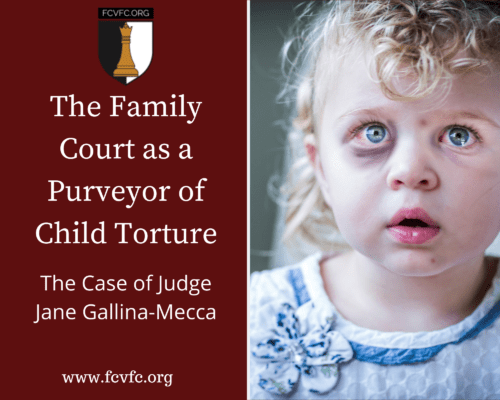
by Guest Contributor (Professional Consultant to the United Nations since 2002 and Family Member in the High-Profile Family Court Case in New Jersey)
The international community overwhelmingly regards torture as completely unacceptable.
–The Geneva Convention of 1949, amended in 1977, prohibits torture and other inhuman treatment.
–The 39th session of the United Nations (UN) General Assembly, occurring in 1984, adopted the Convention Against Torture and Other Cruel, Inhuman or Degrading Treatment or Punishment. A vast majority of countries worldwide ratified the Convention.
–The 63rd session of the Committee against Torture, occurring in 2018, discussed the special vulnerability of children to torture and inhuman and degrading treatment because of the long-term interruptions to their normal psychological, emotional, and social development that may result in permanent harm.
As defined by international law, torture comprises the following crucial elements:
1. The intentional infliction of severe pain or suffering, whether physical or mental.
2. That it is inflicted for a purpose (to obtain information, to punish victims, to intimidate victims, or for any reason based on discrimination).
3. That it is inflicted at the instigation of or under the acquiescence of a public official (or any authority governments turn a blind eye to).
The threshold at which treatment may constitute torture is lower when it comes to children, especially when they are deprived of their liberty, because children are still developing physically and emotionally.
Family Courts have long treated children like second-class citizens, placing parental “rights” above the desires and developmental needs of children. In recent decades, their routine practices, such as the forcible transfer of children from competent primary caregivers to the custody of alleged abusers, often ignoring children’s explicit objections, amount to a policy of torture.
In the United States, three-quarters of abused children in contested custody cases end up with the abusing parent, usually the one with greater financial means. Hence, even while taking into account the idiosyncrasies of U.S. law, Family Court practices satisfy each of the above elements:
1. Severe pain or suffering on the part of children by ordering them into a life of abuse and its sequelae (all the more so because of their developing brains).
2. Routine punishment and intimidation of protective parents for reporting abuse, sometimes by jailing them (with special discrimination against mothers).
3. Ready acquiescence to the wishes of abusing parents (often with financial means), if not proactive instigation on the part of Family Court judges and other court actors.
The vast literature on Adverse Childhood Experiences (ACE) confirms that the neurological, physiological, and psychological impact of acute childhood traumas like forcible separation from the loving parent and court-sanctioned imprisonment with the abusing one rises to the level of severe pain or suffering—and thus torture—under international law.
Indeed, this may be one of the worst forms of torture, which can result in enduring damage if subjected to toxic stress at crucial developmental stages.
Toxic stress is a response that can occur when a child experiences strong, frequent, and prolonged adversity, such as living with a parent who mistreats them. Separation from primary supports—who in essence serve as a buffer from the adverse effects of toxic stress—worsens the long-term damage.
The Family Court practice of routinely and casually ripping even nursing infants away from the caregiver they are attached to (usually the mother), to consign them to chronic neglect and exposure to violence (usually under the father), in the name of “father’s rights,” forebodes lifelong physical and psychological problems, in addition to the loss of decades of life.
Therefore, the Family Court norm of separating abused children from their primary caregivers to deliver them to abusers is the cause of intense suffering in both the children and their caregiving parents, but especially in children, and amounts to court-sanctioned torture. As expected, hundreds of such children transferred by Family Courts in the United States either kill themselves or are killed by the abusing parent, year after year, reaching epidemic proportions.
While this torture of children by Family Courts is widespread, New Jersey is said to be one of the hubs, and the courtroom of Judge Jane Gallina-Mecca the center of this hub. As a member of the family of “the high-profile family court case in New Jersey” written about on this site, I witnessed firsthand the decimation of a beautiful family life centering around mother-child bonds that were once the envy of the neighborhood.
This envy came to be too much for the abusive father, when his wife one day had the audacity to stand up to his abuse and his children had the insolence to reject him. Unwilling to admit his own violence but resolute in his desire for revenge, he found a willing accomplice in a corrupt Family Court judge.
Indeed, it did not take more than a few weeks for the judge to declare the mother “mentally ill” without basis, to order full custody transfer to the father, and to threaten to jail the mother (without even a parking ticket under her name) for trying to protect her children. The children by this time were writing suicide notes, attempting to burn down the house, and screaming that they did not wish to go to “that maniac”—the father—for even a few hours with him was “torture” and “worse than death.”
Yet, the dramatic custody transfer, in the opposite direction of common sense and common decency, was effectuated without a trial and without need for evidence, as is routine around the country.
If this can happen to a middle-class, well-educated family undergoing a “normal” divorce, we should be deeply concerned about the psychological harm our nation’s courts are inflicting on the children of our society. Innocent children with previously perfect lives can be destroyed for the profits of an autocratic judge and the wish fulfillment of a rich but incompetent father determined to subjugate others to his will.
The vast medical literature on early childhood trauma demonstrates that common consequences are emotional and behavioral problems, as well as post-traumatic stress disorder (PTSD), mood disorders, anxiety disorders, learning disorders, and personality disorders. Emotional and behavioral problems include fearfulness, nervousness, restlessness, and violent behavior. Children also manifest symptoms of depressed mood, an emotional numbing, changes in appetite or weight, insomnia, excessive worry, feelings of guilt or worthlessness, cognitive changes, memory loss, somatic symptoms such as headaches and stomachaches, experiential avoidance, and suicidal thoughts.
All these symptoms are now present in the above children.
Childhood trauma eventually disrupts the development of a sense of self, which can lead to deleterious psychosocial outcomes, including self-harm, substance use, domestic violence, and suicide. Disrupted attachments and difficulty with trust and security in interpersonal relationships can lead to poor social skills, functional impairments, and risk for repeated trauma or victimization.
Further, the biological effect of traumatic stress exposure is passed down across generations through alterations in gene expression, becoming intergenerational.
It is important to emphasize that, just as research illuminates the effects of torture, it also points to a healthy path forward. Societies can recover from collective trauma through meaningful action, shared goals, and the strengthening of a mutual moral compass. Both individually and collectively, we can hold corrupt judges accountable and create new norms that do not accept judicial abuse of power or violations of the law.
The mother of the above case decided to file federal charges against the judge, for the suppression of evidence and the violation of her due process rights. The prohibition of torture is an absolute and non-depreciable right applied to all human beings without exception, but especially to vulnerable children, and no state actors should place themselves above this law.


